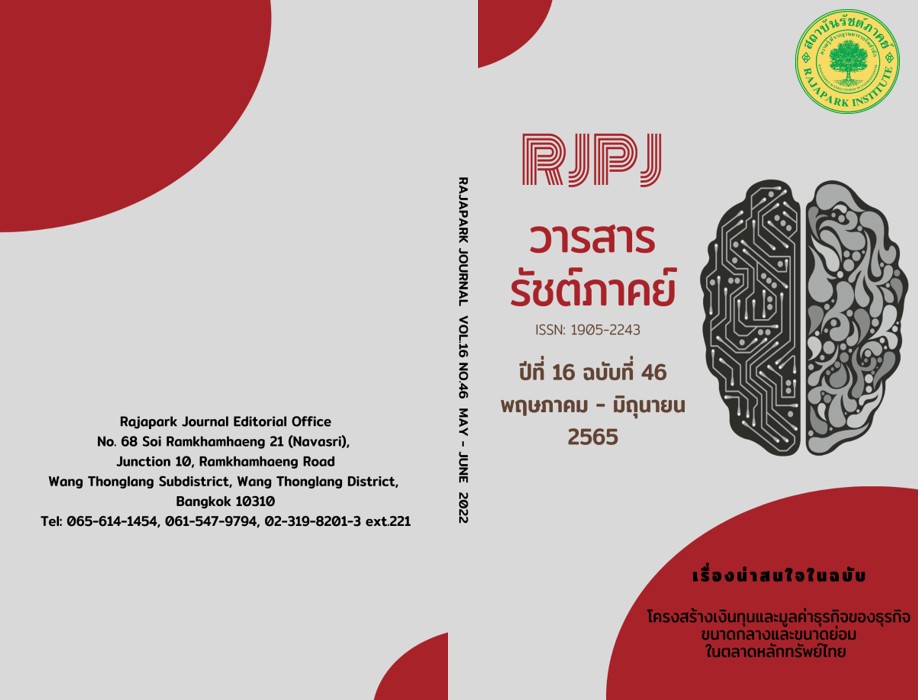Analysis of Discourse Markers in Thai EFL Students’ Essay Writing: A Case Study of a University in Northern Thailand
Main Article Content
Abstract
In language learning and teaching, writing is one skill that students need to study and improve upon to achieve this, discourse markers play a virtual role. This research, therefore, sought to analyze the use and misuse of discourse markers in the essay writing of Thai EFL students at a university in northern Thailand. Data were collected from 262 essays including 131 argumentative essays and 131 descriptive essays from 131 dual-degree undergraduate students enrolled in a Bachelor of Education and Bachelor of Arts in English program, taking Note-taking and Summarizing for Career course. Quantitatively, the study found that the students mostly use inferential discourse markers, followed by contrastive discourse markers, and elaborative discourse markers, respectively. Moreover, from the qualitative contents analysis, it demonstrated that the students misused discourse makers at sentence level within paragraphs without any clear, link between ideas in the paragraphs. This implies that students need to learn more about cohesion and coherence through the use of discourse markers in writing.
Article Details

This work is licensed under a Creative Commons Attribution-NonCommercial-NoDerivatives 4.0 International License.
Views and opinions appearing in the Journal it is the responsibility of the author of the article, and does not constitute the view and responsibility of the editorial team.
References
Ali, E. A. M., & Mahadin, R. S. (2016). The Use of Discourse Markers in Written Discourse by Students of English at the University of Jordan. International Journal of Humanities and Social Science, 6(3), 23-35.
Ament, J., & Páres, J. B. (2017). The Acquisition of Discourse Markers in the English Medium Instruction Context. In Carmen Perez-Vidal, Sonia Lopez-Serrano, Jennifer Ament & Dakota J. Thomas-Wilhelm (eds.), Learning Context Effects: Study Aboard, Formal Instruction and International Immersion Classrooms, 43-74. Berlin: Language Science Press.
Arya, T. (2020). Exploring Discourse Marker Use in Thai University Students’ Conversation. LEARN Journal: Language Education and Acquisition Research Network Journal, 13(1), 247-266.
Chen, J. (2019). What are Discourse Markers?. In Proceeding of Advances in Social Sciences, Education and Humanities Research, Vol 268, 2nd Symposium on Health and Education (SOHE 2019), 1-9.
Dülger, O. (2007). Discourse Markers in Writing. Turkey, Konya Selcuk University. file:///C:/Users/HP/Downloads/450-902-1-SM.pdf
Estaji, M., & Salimi, H. (2018). The Application of Wiki-Mediated Collaborative Writing as a Pedagogical Tool to Promote ESP Learners’ Writing Performance. The ASIAN ESP Journal, 14(1), 112-140.
Fraser, B. (1999). What are Discourse Markers?. Journal of Pragmatics, 31, 931-952.
Fraser, B. (2009). An Account of Discourse Markers. International Review of Pragmatics, 1, 293-320.
Hutchinson, B. (2004). Acquiring the Meaning of Discourse Markers. In Proceedings of the 42nd Annual Meeting on Association for Computational Linguistics, 21-26 July 2004, 684-691.
Kaewlai, J. (2021). The Use of Scaffolding Technique to Develop and English Composition Writing Skill of Undergraduate Students at Rajamangala University of Technology Phra Nakhon, Rajapark Journal, 15(43), 69-83.
Kaewnuch, S. (2016). The Benefits of Recursion, and Inderterminacy in Writing: A Mixed Approach. Udon Thani Rajabhat University Journal of Humanities and Social Sciences, 5(2), 1-23.
Karaata, C., Çepik, Ş. & Çetin, Y. (2012) (2012). Enhancing the Use of Discourse Markers in Academic Writing: The Combination of Incidental Acquisition and Explicit Instruction.
Electronic Journal of Social Sciences, 11(40), 11-29. https://dergipark.org.tr/en/pub/esosder/issue/6154/82682
Karimah, N. A., Munir, A., & Anam, S. (2021). The Use of Discourse Markers in the Background of Thesis Proposals Written by Postgraduate Students. International Journal of Education and Social Science Research, 4(1), 94-111. http://dx.doi.org/10.37500/IJESSR.2021.4111
Khan, M. S. (2016). An Analytical Study of Discourse Markers in Interaction-2 Reading Textbook. The International Journal of Social Sciences and Humanities Invention, 3(5), 2213-2121.
Maschler, Y., & Schiffrin, D. (2015). Unit 9 The Handbook of Discourse Analysis (2nd ed.). (Deborah Tannen, Heidi E. Hamilton, and Deborah Schiffrin, Editors). John Wiley & Sons. https://doi.org/10.1002/9780470753460.ch4
Rahimi, M. (2011). Discourse Markers in Argumentative and Expository Writing of Iranian EFL Learners. World Journal of English Language, 1(2), 68-78. https://doi.org/10.5430/wjel.v1n2p68
Rajabi, S., & Fahim, M. (2015). An Activity Theoretical Framework Analysis of the Persuasive Writing of EFL Learners: Evidence from Self-Regulated Strategy Development Model of Instruction. Indian Journal of Fundamental and Applied Life Sciences, 5(S2), 1556-1568.
Sharndama, E., & Yakubu, S. (2013). An Analysis of Discourse Markers in Academic Report Writing: Pedagogical Implications. International Journal of Academic Research and Reflections, 1(3), 15-24.
Simmons-Mackie, N.N., & Damico, J.S. (2010). The Contribution of Discourse Markers to Communicative Competence in Aphasia. American Journal of Speech-Language Pathology, 5(1), 37-43. https://doi.org/10.1044/1058-0360.0501.37
Surjowati, R. (2018). The Use of Discourse Markers in EFL Students’ Essay Writing. In The 4th PRASASTI International Conference on Recent Linguistics Research (PRASASTI 2018) (248-251). DOI:10.2991/prasasti-18.2018.47
Tiryaki, E. N. (2017). Identification Justification Types and Discourse Markers in Turkish Language Teacher Candidates’ Argumentative Texts. Journal of Education and Training Studies, 5(2), 63-70. http://dx.doi.org/10.11114/jets.v5i2.2033
Zhao, H. (2014). The Textual Function of Discourse Markers under the Framework of Relevance Theory. Theory and Practice in Language Studies, 4(10), 2105-2113. https://www.academypublication.com/issues/past/tpls/vol04/10/17.pdf


